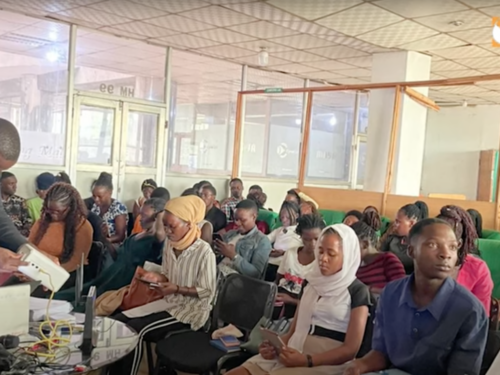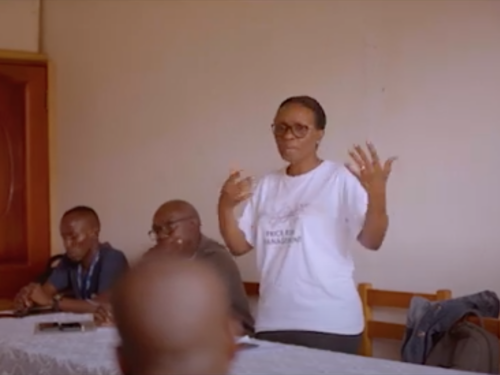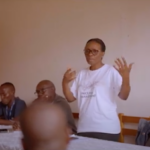Cultivating Success Through ADC’s Business Accelerator Program (BAP)

AFRICA HAVEN – Transformation of an African exporter
Africa Haven, a prominent player in the global trade of tropical and exotic fruits and vegetables sourced from African producers, has seen exponential growth in its exports thanks to the transformative impact of the Business Accelerator Program (BAP).
Access to affordable credit remains one of the most pressing issues for agribusinesses in Uganda. A lack of collateral and the burden of high interest rates create formidable barriers for entrepreneurs seeking to invest in their farming operations or expand their businesses.
Limited access to markets, both domestically and internationally, is another significant hurdle. Many agribusinesses, struggle to reach consumers due to a lack of market information and infrastructure.
The adoption of modern farming techniques and technologies has been slower than desired. Many agribusinesses, especially those in rural areas, lack access to vital tools and knowledge that could significantly boost productivity and competitiveness.
The state of rural infrastructure in Uganda, including roads, electricity, and storage facilities, poses a considerable challenge. Poor infrastructure increases transportation costs and hampers efforts to efficiently process and store agricultural products.
Climate change and its unpredictable impacts, such as prolonged droughts and devastating floods, pose a constant threat to agricultural productivity. Smallholders, in particular, bear the brunt of these weather-related challenges.
Inadequate post-harvest handling and storage facilities contribute to significant losses of agricultural produce. This not only diminishes profits but also affects food security by reducing the availability of crops for local consumption.
KIKAZI’S MILLET FLOUR – A flourishing enterprise courtesy of BAP
Start-ups have been impacted in a significant measure too. Grace Kikazi, a specialist in producing high-quality millet flour, has emerged as a success story, all thanks to the Business Accelerator Program (BAP).
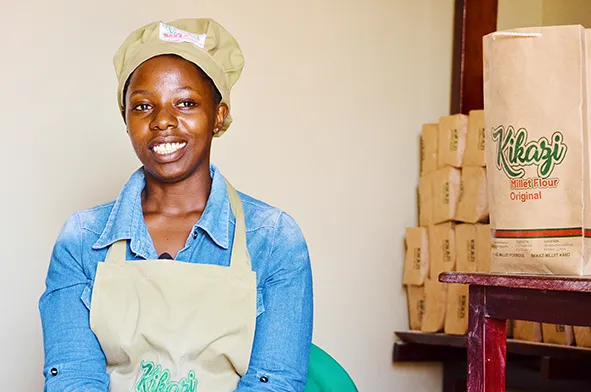
Founded in 2019, Kikazi’s journey from a small-scale cottage industry to a flourishing enterprise is a testament to the power of knowledge and training. Under the guidance of BAP, Kikazi successfully registered her business, obtained a trademark and a UNBS quality mark, and registered with Uganda Revenue Authority (URA). Kikazi, the founder of Kikazi Millet Flour Original, was inspired by a mother in Fort Portal who needed quality millet flour for a diabetic patient. Hailing from the millet-rich region of Bushenyi-Rukungiri, Kikazi saw the potential and gradually began her millet flour venture on a small scale. In 2020, she decided to take it more seriously, but the Covid-19 pandemic posed initial challenges. With a modest initial investment of Shs3m from her savings, Kikazi ordered millet grain from farmers in western Uganda. She sorted and cleaned the grain before packaging it. In the beginning, production was limited to a few bags, each weighing around 100kg. Kikazi outsourced the grinding machine and carried out packaging at her home in Kireka, operating as a cottage industry.
In April of this year, Kikazi received guidance from an expert associated with ECOS, a project aimed at enhancing the competitiveness of Ugandan SMEs. The expert emphasised the need for a solid structure to scale up her business. It was during this time that Grace was introduced to ADC and embarked on a journey of learning. Through the Business Accelerator Program, Kikazi gained crucial insights into corporate governance, organisation, and formal business registration. There are quite a number of things I thought I should implement though I haven’t implemented some. What I did for example, I shifted from home. I learnt that proper record keeping is really important. I also learnt that I don’t need to do everything on my own. Previously Kikazi was registered as a just a business name, I learnt that if you keep in that area you stay small and can’t scale up, you can’t be a supplier and you can’t be profiled in a government database,” she says of BAP’s impact.
BAP also highlighted the significance of digital marketing in today’s era, leading her to establish an online presence for Kikazi. Kikazi aspires to acquire a high-quality milling machine and secure financing for marketing efforts. She is also focused on establishing robust corporate governance structures and efficient sales management systems for Kikazi.
“With the linkages the programme exposed me to, I am sure of securing financing to have all this done and be able to tap into the export market,” she says. Kikazi emphasises the relevance and practicality of the training received through BAP. She advises fellow entrepreneurs to attend such programs whenever possible. “The trainings were physical and when you have those interactions, you get to understand the concepts much better,” she says.
RAW&ORGANIC – BAP gives wings to shea butter business
Raw & Organic, a company specialising in the extraction of pure Shea butter, has seen remarkable transformation, because of the Business Accelerator Program (BAP). Enid Natukunda Mugisha, began her journey in 2019 and has since not only built a thriving business that has also made a meaningful impact on her own life.
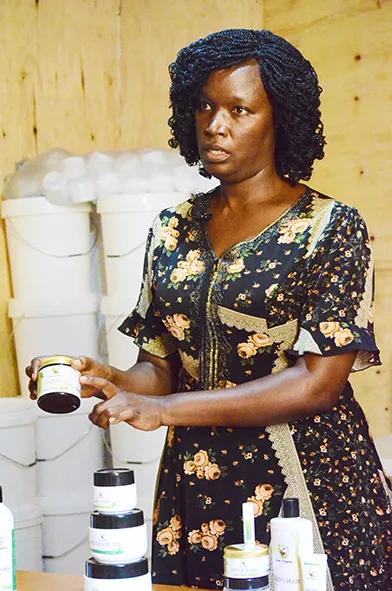
Natukunda’s entrepreneurial journey was born out of personal struggle. Her own battle with alopecia, a hair-loss condition, led her to seek natural remedies like Shea Butter. After losing her hair, particularly during the COVID-19 lockdown when she couldn’t visit her hairdresser, she decided to add value to Shea Butter. Shea Butter Nilotica, made from the nuts of the Nilotica Shea tree, is renowned for its natural properties and benefits for hair and skin. Raw & Organic sources Shea nuts from northern Uganda, and through the cold-press extraction method, they produce pure Shea butter. The company is UNBS certified, ensuring the authenticity and quality of their products. While Shea Butter was the initial focus, Natukunda expanded her product range to include skincare and hair products. The demand for these products grew as customers experienced the benefits. The company now produces shampoos, hair conditioners, treatment products, and hair food, among others.
The sustainability of Shea nut trees is a concern due to the impact of charcoal businessmen. These trees take around 35 years to yield nuts, making their protection vital. Additionally, Natukunda faces challenges in securing a permanent location for her business and expanding into export markets to boost demand.
“I am not sure when I will be moving to another place. Our new place was dilapidated but luckily there is efficient power supply. We put in a lot of money to clean it and we even got into debt,” she says. Our hope is to get land and have a structure of our own. Natukunda discovered BAP through DFCU Bank’s ‘Women in Business’ forum and decided to enroll.
“Someone in another business group told me about BAP as a hot cake. She had got to know about it through ECOS, which is funded by GIZ. That is why I didn’t hesitate to enroll for BAP,” she says. The program provided invaluable knowledge and practical insights. It emphasised corporate governance, encouraging the formation of advisory boards. Financial literacy and management practices improved, helping Natukunda create a comprehensive business plan.
“We now know how to do a business plan. I had a shoddy business plan but they helped us to develop the new one we are using. We now even have a marketing plan with them step by step. That has improved a lot in our work. All along I was doing this by myself. Even the money was coming through my account but now I am getting out slowly by slowly. The funders and bankers look at the company not an individual,” she said.
Raw & Organic is actively working on marketing and sales strategies to expand its reach. Natukunda is considering stocking more products this year to meet increasing demand. She emphasises the need for patient capital to fund business growth and is looking for grants to achieve this.
“There’s nothing you can do without money. If I do marketing the right way, demand will increase. I will need more products. This calls for more capital investment in the value chain,” she says.
For someone who has not attended BAP training, Natukunda says they should do.
“Even if you don’t need the capital, they help you put your house in order. Through the training, we are now on the journey of product certification with UNBS. You may have happy customers,but you need to certify your products with quality marks,” she says.
JAKI AGRIBUSINESS – A side hustle that blossomed
Janet Kibwika, a 66 year old poultry farmer, has witnessed a remarkable transformation in her agribusiness journey, and at the heart of this transformation lies the invaluable support she received from the BAP training.

From humble beginnings as a poultry farmer supplementing her income, Kibwika’s story exemplifies the power of knowledge, training, and the right support system in propelling an agribusiness to success.
Kibwika embarked on her poultry farming journey in 1994 while working as a transporter at Kyagalanyi Coffee Company. What started as a side hustle with 250 birds in her garage soon became a thriving venture. During the early days, the poultry market was favourable, and Kibwika was making substantial profits which reinforced her commitment to the business.
Kibwika’s determination led her to save enough money to purchase her first piece of land within just three rounds of poultry sales. She continued to expand, eventually acquiring two acres of land in Wakiso District in 2009. Kibwika’s love for chicken rearing became her daily routine, and she was managing a stock of 1,000 chickens monthly before the Covid-19 pandemic hit. The pandemic presented unforeseen challenges as lockdowns disrupted her sales. With 650 birds ready for sale during the first lockdown, Kibwika struggled to find buyers. Her profits dwindled, and she found herself exploring alternative businesses. At this point, Kibwika realised the importance of formalizing her business.
Kibwika’s journey took a significant turn when she attended a farmer’s meeting in Nansana, where she met a veterinarian officer who referred her to a business training session at Ivory Hotel. This is where she met Mr. Jimmy Byaruhanga, a trainer with the ECOS program. ECOS focuses on equipping small and medium-sised enterprises (SMEs) with the skills needed for growth.
Kibwika’s interaction with ECOS trainers emphasised the importance of business registration, financial management, and other essential aspects of running a successful enterprise. She realised that without formalising her business, she was limiting her potential. With guidance from ECOS, Kibwika registered her business as Jaki Agribusinesses Limited, a name derived from her own, Janet Kibwika. She obtained a Tax Identification Number (TIN), setting her on the path to compliance. The training extended over four months and covered various critical topics, including financial management and price risk management. Kibwika attended every session diligently and opened a bank account for her business. She learned the significance of record-keeping, which she now takes seriously. Separating personal and business finances became a priority, leading to improved financial discipline.
“Now I write down everything and I have learnt to separate my own money for domestic expenses from the business. Now I realise, it is not my own now but for us. You see with us farmers, documenting is a very big problem. For instance, when you buy chicken feeds, you postpone it to another day because you are tired. When it continues like that, you forget,” she says.
Kibwika’s participation in the training introduced her to a network of fellow farmers and entrepreneurs. Interacting with people from diverse backgrounds and businesses allowed her to share experiences and expand her knowledge base. As a poultry farmer, she recognised the potential for growth but also the need for financial support.
Kibwika’s journey has opened her eyes to possibilities she hadn’t explored before. Her immediate goal is to restore her business to pre-pandemic levels, which requires financial assistance. Currently, she manages 250 birds and envisions expanding her chicken house into a double-story structure for year-round production. She learnt how to diversify her business by venturing into related businesses.
“I have to be on the market regularly. But even beyond, I have been taught about the value chain. You can do businesses which are in the same line. I have the plan of keeping the layers also. I also have a plan of starting a bakery because I have every done it. I can also open up a shop selling the feeds because I have all the knowledge,” Kibwika says.
Kibwika expresses her gratitude to the BAP program and its facilitators, who demonstrated a genuine concern for the success of businesses like hers. She acknowledges the transformative power of knowledge and emphasises the importance of record-keeping and financial management for farmers and entrepreneurs alike.
Kibwika and her fellow program participants graduated in June and were featured on the Uganda Investment Authority (UIA) portal, a significant pathway to business development.

